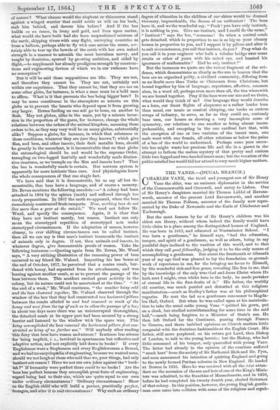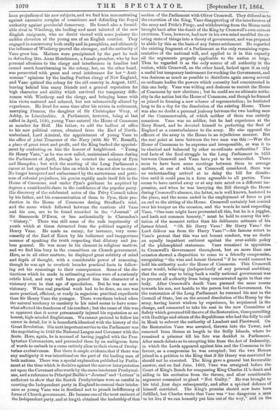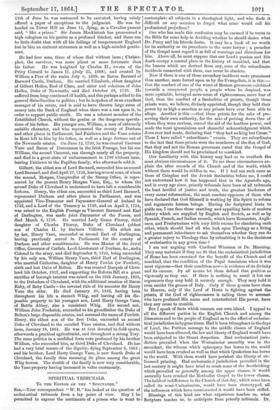THE VANES.—(DUCAL BRANCH.)
CHARLES VANE, the third and youngest son of Sir -Henry Vane the elder, was an eminent diplomatist in the service of the Commonwealth and Cromwell, and envoy to Lisbon. One of Sir Henry's daughters married Sir Thomas Liddel of Ravens- worth, ancestor of the present Lord Ravenswortli, and another married Sir Thomas Pelham, ancestor of the family now repre- sented by the Duke of Newcastle and the Earls of Chichester and Yarborough.
But the most famous by far of Sir Henry's children was his eldest son Henry, without whom indeed the family would have little claim to a place among the distinguished houses of England. He was born in 1612, and educated at Westminster School. " I was born a gentleman," he himself says, " had the education, temper, and spirit of a gentleman, as well as others, being in my youthful days inclined to the vanities of this world, and to that which they call good fellowship, judging it to be the only means of accomplishing a gentleman. But about the fourteenth or fifteenth year of my age God was pleased to lay the foundation or ground- work of repentance in me, for the bringing me home to Himself, by His wonderful rich and free grace, revealing His Son in me, that by the knowledge of the only true God and Jesus Christ whom He bath sent I might, even whilst here in the body, be made partaker of eternal life in the first-fruits of it." 'His father, the worldly old courtier, was much puzzled and disturbed at this religious manifestation—much as Shelley's father was at his philosophical vagaries. He sent the lad as a gentleman commoner to Magda- len Hall, Oxford. But when he was called upon at his matricula- tion to take the usual oaths young Vane " quitted his gown, put on a cloak, but studied notwithstanding for some time in the said hall,"—much being forgiven to a Minister of ' State's son. He then left Oxford for the Continent, passing through France to Geneva, and there imbibed opinions oa Church matters little congenial with the doctrines fashionable at the English Court. His father, still more perplexed, on his return got Laud, then Bishop of London, to talk to the young heretic ; but the Bishop, who had
little command of his temper, only quarrelled with young Vane. The latter had already in the opinion of the courtiers suffered " much hurt" from the society of Sir Nathaniel Rich and Mr. Pym, and soon announced his intention of quitting England and going to the newly formed Puritan colonies in New England. He landed
at Boston in 1635. Here he was received with all the éclat atten-
dant on the accession of the son and heir of.one of the King's Minis- ters 'was admitted, to the franchise of Massachusetts, and in 1638, before he had completed his twenty-fourth year, elected Governor of that colony. In this position, however, the young English gentle- man soon came into collision with-some of the religions and repub-
section of the Parliament with Oliver Cromwell. They differed as.to the execution of the King, Vane disapproving of the interference of the army and Pride's Purge, and withdrawing from the House until brought back after the death of the King by Cromwell's own earnest exertions. Vane, however, had now in his own mind moulded the ex- isting state of things into a theory of government, and was prepared to abide by this as the basis of any future settlement. He regarded the existing fragment of a Parliament as the only remaining repre- sentative of the national will, and applied to it in this capacity all the arguments properly applicable to the nation at large. Thus he regarded it as the only source of all authority in the nation, while Cromwell, on the other hand, looked upon it as only a useful but temporary instrument for working the Government, and was desirous as much as possible to distribute again among several co-ordinate bodies the powers which necessity had concentrated in this one body. Vane was willing and desirous to recruit the House of Commons by new elections ; but he could see no ultimate autho- rity in the nation but the House of Commons, and though he framed or joined in framing a new scheme of representation; he hesitated long to fix a day for the dissolution of the existing House. There was also no doubt a personal jealousy between the two leading men of the Commonwealth, of which neither of them was entirely conscious. Vane was no soldier, but he had experience at the Navy Board, and he devoted himself to perfecting the fleet of England as a counterbalance to the army. He also opposed the officers of the army in the House in an injudicious manner. But the real point at issue between the two men was this :—Was the House of Commons to be supreme and irresponsible, or was it to be checked and balanced by other co-ordinate authorities? The real facts of the final struggle in the Long Parliament in 1653 between Cromwell and Vane have yet to be unravelled. There seem to have been some meetings between them to arrange matters, at one of which, as Cromwell considered, there was an understanding arrived at to delay the bill for dissolu- tion until it could pass in a form agreeable to all parties. Vane seems to have carried away or at any rate acted on a different im- pression, and when he was hurrying the Bill through the House during Cromwell's absence, the latter, as is well known, hastened to the place, and the scene ended in the employment of force to put an end to the sitting of the House. Cromwell certainly lost control over his temper on the occasion, and the words he used respecting Vane, "One man might have prevented all this, but he is a juggler, and hath not common honesty," must be held to convey the irri- tation of the moment rather than his deliberate estimate of his former friend. " Oh Sir Harry Vane ! Sir Harry Vane ! the Lord deliver me from Sir Harry Vane !"—his famous retort to Vane's protest that this was not honest conduct, was no doubt an equally impatient outburst against the over-subtle policy of the philosophical statesman. Vane remained in opposition to Cromwell's Government throughout, but on more than one occasion showed a disposition to come to a friendly compromise,. recognizing " the wise and honest General " if he would consent to hold his authority under the House of Commons. This Cromwell. never would, believing (independently of any personal ambition) that the only way to bring back a really national government was• to prevent all authority from being concentrated again in that one body. After Cromwell's death Vane pursued the same 'course towards his son, not hostile to the person but the Government. On. the restoration of the Long Parliament he resumed his seat in the Council of State, but on the second dissolution of the Rump by the army, having learnt wisdom by experience, he acquiesced in the change, and consented to take his seat in the new Committee of Safety which governed till theeve of the Restoration, thusquarrelling with Hesilrige and others of the Republicans who had the folly to call in Monk to subvert the authority of Lambert and Fleetwood. On the Restoration Vane was arrested, thrown into the Tower, and removed from thence at length to the Scilly Islands, where he remained a prisoner till his fate was decided in Parliament. After much debate as to excepting him from the Act of Indemnity, in which the Lords appeared against him and the Commons in his. favour, as a compromise he was excepted; but the two Houses joined in a petition to the King that if Sir Henry was convicted he should not be executed. The King gave a general but favourable answer, and on 2nd June, 1662, Vane was arraigned before the Court of King's Bench for compassing King Charles IL's death and aiding in his exclusion from the throne, and after considerable argument consented to plead "Not Guilty." He was brought to his trial Jour days subsequently, and after a spirited defence of himself convicted. The King's promise should now have been fulfilled, but Charles wrote that Vane was " too dangerous a man to let live if we can honestly put him out of the way," and on the
11th of June he was sentenced to be executed, having vainly offered a paper of exceptions to the judgment. He was be- headed on Tower Hill on June 14, dying, as a Cavalier present said, " like a prince." Sir James Mackintosh has pronounced a high eulogium on his genius as a profound thinker, and there can be little doubt that with all his failings of temperament England lost in him an eminent statesman as well as a high-minded gentle- man.
He had four sons, three of whom died without issue ; Christo- pher, the survivor, was more pliant or more fortunate than his father. He was knighted by Charles IL, sworn of the Privy Council to James II. (July 25, 1688), and created by William a Peer of the realm July 8, 1699, as Baron Barnard of Barnard Castle, Durham. He married Elizabeth, eldest daughter of Gilbert Holes, Earl of Clare, and sister and coheiress of John Holies, Duke of Newcastle, and died October 28, 1723. He suffered from long-continued ill health, and this perhaps added to his general disinclination to politics ; but he is spoken of as an excellent manager of his estate, and is said to have thrown large sums of money into the Bank of England when there was a run upon it, in order to support public credit. He was a tolerant member of the Established Church, without the genius or the dangerous specula- tions of his father. His younger son, William, a man of extremely amiable character, and who represented the county of Durham and other places in Parliament, had Fairlawn and the Vane estates in Kent left to him by his father, as well as a large fortune out of the Newcastle estates. On June 12, 1720, he was created Viscount Vane and Baron of Duncannon in the Jrish Peerage, but his son William, the second Viscount, ran through nearly all the property, and died in a great state of embarrassment in 1789 without issue, leaving Fairlawn to the Papillon family, who afterwards sold it.
Gilbert, the eldest son of Lord Barnard, succeeded him as second Lord Barnard, and died April 27,1753, leavingseveral sons, of whom the second, Morgan, Comptroller of the Stamp Office, is repre- sented by the present Henry Morgan Vane, Esq., to whom the second Duke of Cleveland is understood to have left a considerable fortune. Henry, the eldest son, succeeded as third Lord Barnard, represented Durham and other places in Parliament, and was appointed Vice-Treasurer and Paymaster-General of Ireland in 1742, and a Lord of the Treasury in 1749, and on April 3, 1754, was raised to the English Peerage as Viscount Barnard and Earl of Darlington, was made joint Paymaster of the Forces, and died March 6, 1758. He married Lady Grace Fitzroy, third daughter of Charles Fitzroy, Duke of Cleveland (eldest son of Charles IL by Barbara Villiers). His eldest son by her, Henry Vane, succeeded as second Earl of Darlington, having previously served in Parliament for the county of Durham and other constituencies. He was Master of the Jewel Office, Governor of Carlisle, Lord•Lieutenant of Durham, &c., and a Colonel in the army, and died September 8, 1792, being succeeded by his only son, William Henry Vane, third Earl of Darlington, who married Catherine, daughter of Henry Pawlet (or Powlett), sixth and last Duke of Bolton. He was created Marquis of Cleve- land 5th October, 1827, and supporting the Reform Bill at a great sacrifice of borough interest was raised on the 29th January, 1833, to the Dukedom of Cleveland, with the additional creation of Baron Raby, of Raby Castle—the coveted title of his ancestor Sir Henry Vane the elder. He died January 29, 1842, having been throughout his life a staunch Whig, and leaving all his dis- posable property to his youngest son, Lord Harry George Vane, of Battle Abbey, also a consistent Whig. His second son, William John Frederick, succeeded to his grandfather the Duke of Bolton's large disposable estates, and assumed the name of Powlett. Henry, the eldest son of the first Duke, succeeded as second Duke of Cleveland to the entailed Vane estates, and died without issue, January 18, 1864. He was at first devoted to field sports, afterwards a practical agriculturist, and throughout a strong Tory. The same politics in a modified form were professed by his brother William, who succeeded him, as third Duke of Cleveland. He has had a very brief tenure of the dignity, dying September 6, 1864 ; and his brother, Lord Harry George Vane, is now fourth Duke of Cleveland, the family thus resuming its place among the great Whig houses. The wealth of the family is now very considerable, the Vane property having increased in value enormously.
































 Previous page
Previous page